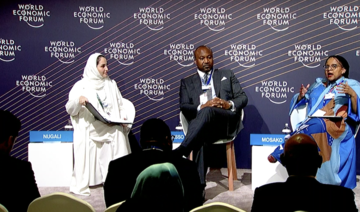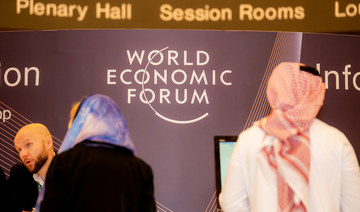LONDON: Standard Chartered’s landmark attempt to claw back bonuses paid to staff deemed responsible for its current woes could be fraught with practical and legal difficulties, lawyers and investors said.
CEO Bill Winters said on Tuesday the bank could recover the bonuses of up to 150 senior staff, if they are found culpable of breaching internal rules during a freewheeling lending era under his predecessor Peter Sands, who left last June.
The attempted clawbacks could represent a test case as to the enforceability of tough new rules put in place by Britain last year, as a response to the financial crisis, allowing banks to seek recovery of bonuses from bankers deemed to have acted irresponsibly up to 10 years after they are paid out.
Lawyers said it would be the first time a bank has sought such clawbacks en masse since the new regulations were put in place. Attempts to recover bonuses have so far been rare, and have focused on individuals accused of clear misconduct.
Winters’ announcement of “robust accountability reviews” came as StanChart reported its first annual loss in 26 years, with bad loans jumping from $7.5 billion at the end of 2014 to $12.8 billion by the end of 2015.
Some investors, however, are not holding their breath for material windfalls from the plan, particularly from those executives who are no longer employed by the bank.
“It is a very reasonable idea, but probably a nightmare to enforce,” one senior manager at a fund that owns Standard Chartered shares said, while a second investor said it may be more practical to design stricter remuneration structures than to try and claw money back.
A spokesman for StanChart in London declined to comment.
LEGAL BATTLEGROUND
Britain has among the world’s toughest rules on banker pay, introduced following public and political anger over lenders being bailed out by taxpayers in the crisis and bankers pocketing big payouts at a time of austerity for many people.
The rules allow for bonuses to be cut, stopped or clawed back where bankers are subsequently found to have acted irresponsibly or breached risk or compliance regulations.
Lawyers familiar with laws governing banker pay said the key distinction was between so-called malus — the cancelation of an intended future payment — and clawbacks, where a bank tries to recover monies already paid out.
The latter is much harder to enforce.
“Even if you have a very well crafted clawback clause, it can be hard in practice to demonstrate that an individual’s behavior has led to a particular result,” said Anna McCaffrey, senior associate in the employment practice at Taylor Wessing.
Clawbacks face several other challenges, including the difficulty of claiming back funds where a banker has moved to another part of the world or another company.
The Bank of England proposed new rules in January to close the loophole for such so-called “roving bad apples” but they are not yet in force so would not apply to the StanChart plan.
Lawyers said that recovering money in such cases, or proving that specific individuals could be blamed for a given failure in risk management by the bank, could be extremely difficult.
“We haven’t seen a big legal fight about clawback yet, and no one really knows how these arguments will play out,” said Jon Gilligan, partner at GQ Employment Law.
‘SYMBOLIC ACTION’
StanChart CEO Winters said on Tuesday that some former senior executives at the bank had already paid a price for the lender’s problems, without naming them.
Long-term share incentives awarded in 2013 expired worthless after some senior executives failed to meet performance targets, the bank’s annual report said. Former finance director Richard Meddings and former consumer banking head Steve Bertamini were among those who failed to meet performance measures and saw those incentives lapse, according to the report.
StanChart has also held back a total of $61 million worth of unvested shares pledged to senior managers and “risk takers” such as traders and loan officers in 2015 due to ‘performance adjustments,’ according to a Reuters calculation from the company’s annual report. Unvested shares are those that will be awarded at a future date, subject to conditions.
Among the most high-profile StanChart bankers at risk of clawback is Mike Rees, the 26-year veteran of the bank and former deputy CEO, who will leave the bank at the end of this year. StanChart said on Jan. 7 that Rees’s unvested share bonuses “remain subject to ... potential clawback.”
Rees was key to the shaping and execution of the bank’s strategy under former CEO Sands.
Lawyers said that while enforcing clawbacks could be fraught with difficulties, the mere attempt could reassure bruised investors — who have seen StanChart shares plunge 31 percent this year — that the lender is trying to promote accountability for risk-takers.
“Pressure may be coming from shareholders, who have lost a lot of money recently, and it’s unlikely you will be able to claw back anything like what they have lost, but it is a symbolic action,” said GQ Employment Law’s Jon Gilligan.
StanChart’s bid to claw back bonuses faces legal quagmire
StanChart’s bid to claw back bonuses faces legal quagmire
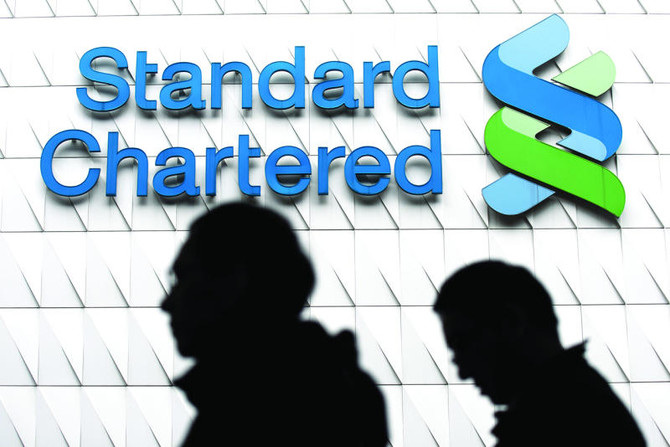
Saudi Arabia, UAE have world’s most ambitious decarbonization programs: WEF panel
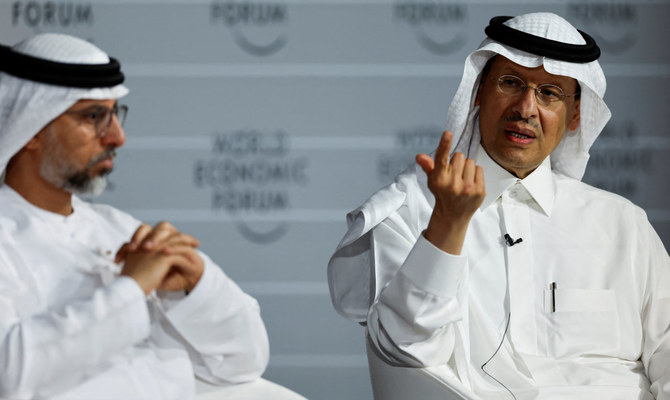
- “Solving sustainability problems requires technology and China has contributed greatly by increasing technical progress and making the cheapest energy available to the world”
DUBAI: A panel of ministers and experts gathered at the World Economic Forum in Riyadh on Sunday to discuss the road map for tripling renewables by 2030.
The UAE’s Minister of Energy and Infrastructure Suhail Mohamed Al-Mazrouei said his country’s goal would not only be reached but possibly exceeded by 2030.
“The UAE has been offering solar power to aid the world in reaching the goal of tripling renewables,” he said. “We have very few years until 2030, we need to work alongside and encourage countries to make the achievement by then.”
Li Zhenguo, president of Longi Green Energy Technology, said the Chinese government had been at the forefront of efforts to develop renewables.
“In 2023, China installed 216 solar power plants, which is more than 50 percent of the global capability,” he said.
“Solving sustainability problems requires technology and China has contributed greatly by increasing technical progress and making the cheapest energy available to the world.”
Marco Arcelli, CEO of Saudi-based ACWA Power, said he was surprised by the momentum in the region.
“Saudi and UAE have the most ambitious decarbs programs in the world. There is a speed and dimension you don’t see much elsewhere,” he said.
“There is leadership with a vision, there is cheap energy available and I believe you will start seeing greenshoring in the Kingdom by 2030. Lots of upcoming projects in the country, be it NEOM or others, will be solar driven and using renewable energy.”
Kuwait’s Minister of Electricity, Water and Renewable Energy Salem Alhajraf said there was a need to increase global production capacity.
“Innovative financing is key,” he said. “We need to move from small giga-sized projects to deploying renewables. Cities or towns with small populations can possibly have all their needs met by solar power.”
Stephanie Jamison, global Resources Industry Practices chair at Accenture, said her company had been developing guidelines for community engagement and nature transition.
“By conducting surveys and interviewing various CEOs, it has become clear that companies understand the impact they are making on nature. And so, partnerships between companies and proactive partnerships between companies and the community is one way to tackle challenges.”
Saudi energy minister, EU official discuss cooperation on clean energy
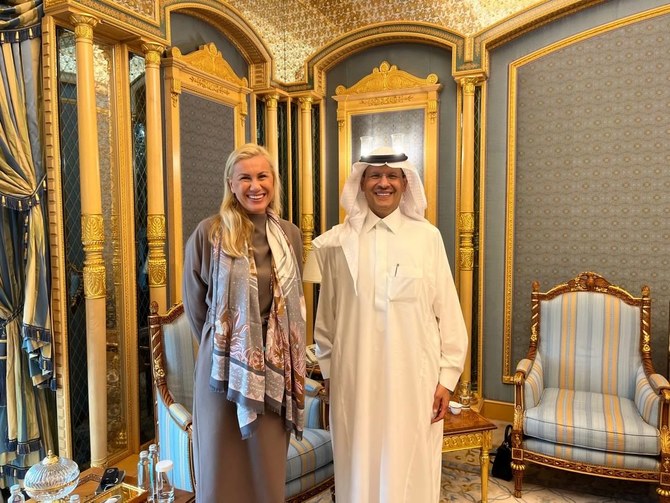
RIYADH: Saudi Energy Minister Prince Abdulaziz bin Salman on Sunday held talks with EU Energy Commissioner Kadri Simson to discuss prospects for cooperation in the field of clean energy.
The top officials met on the sidelines of the World Economic Forum in the Saudi capital, the Saudi Press Agency reported. They discussed ways to strengthen bilateral ties, boost cooperation for the promotion of green energy and advance the goals of the Paris Agreement and ensure the implementation of the outcomes of the COP28 held in Dubai last year.
The Paris Agreement is an international treaty on climate change that was adopted back in 2015. It was negotiated by 196 parties at COP21 in France and covers climate change mitigation, adaptation, and finance.
They reaffirmed the common goals of Saudi Arabia and the EU and the determination of both parties to accelerate private investment in the renewable energy sector, cooperate on electricity interconnection and the integration of renewables into the electricity grid.
The officials stressed the need to strength the electricity supply infrastructure through demand side management smart grid. They also discussed carbon capture, utilization and storage technology and opportunities for industrial partnerships in those sectors.
They also shared their view on building on the UNFCCC, the Paris Agreement and COP28 outcomes. The officials also discussed a Saudi-EU memorandum of understanding to boost cooperation in the energy sector.
According to SPA report, they were of the view that such an MoU should provide a solid and mutually beneficial basis for orienting and anchoring investment decisions in the energy and clean tech sectors, involve and mobilize stakeholders from the public, private and financial sectors, and lay the foundation for a more sustainable and secure energy future.
The European Commission and Saudi Arabia aim to conclude the MoU in the next few months.
Saudi Arabia to host 28th World Investment Conference in Riyadh
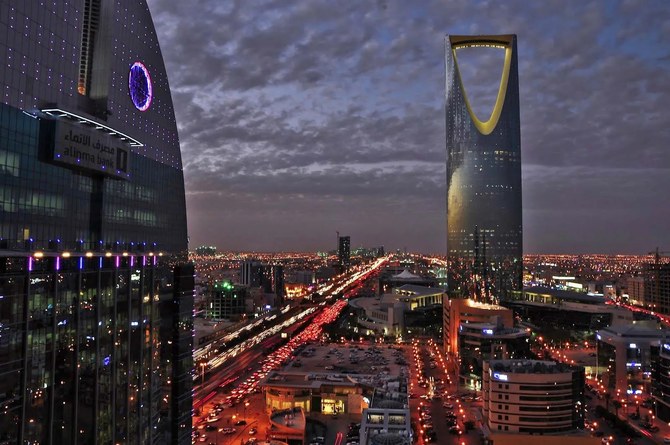
RIYADH: Saudi Arabia is on track to host the 28th World Association of Investment Promotion Agencies’ World Investment Conference from Nov. 25 to 27 in Riyadh.
The forum themed “Future-ready IPAs: Navigating digital disruption and sustainable growth,” will bring together leaders from investment promotion agencies, corporates, multilateral institutions, and other stakeholders to discuss global financial trends and opportunities, according to a statement.
The Kingdom’s selection as a host underscores its position as an international funding hub, according to Saudi Investment Minister Khalid Al-Falih.
“We are honored to be welcoming the global investment community to Saudi Arabia. Our strategic location at the crossroads of three continents, coupled with our world-class investment ecosystem and long-term political and economic stability, has seen the Kingdom develop into a global investment hub,” Al-Falih said.
“The World Investment Conference will serve as a platform to showcase our nation’s potential and forge partnerships that will shape the global investment landscape for years to come,” the minister added.
On WAIPA’s behalf, Executive Director and CEO Ismail Ersahin said: “WAIPA is honored that the 28th WAIPA World Investment Conference will be held in Riyadh, a city with a rich history and culture.”
Ersahin added: “With each edition, the WIC reaffirms its status as a guiding force for sustainable and inclusive development.”
He went on to stress how the conference is poised to be an impactful gathering aimed at the future readiness of IPAs.
Since 1995, the annual gathering has provided a forum for stakeholders to exchange insights and best practices and forge partnerships that drive economic development globally.
Human capital a ‘key challenge’ for Kingdom’s tourism sector, says Saudi minister
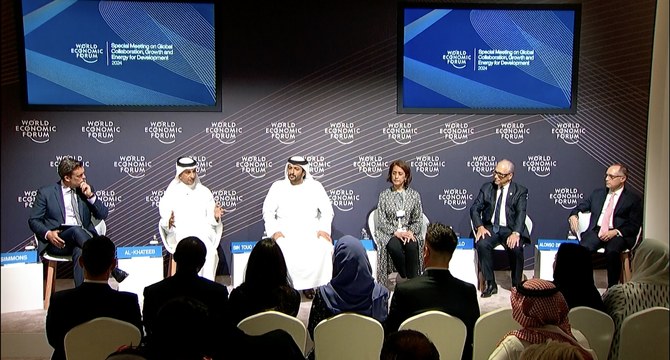
- Saudi Arabia's tourism sector is 'heading to achieve $80 billion this year' in private investment, Al-Khateeb told a WEF panel
LONDON: Developing human capital is a key challenge for Saudi Arabia’s travel sector, the country’s tourism minister has said on Sunday.
Ahmed Al-Khateeb, speaking during a two-day meeting of the World Economic Forum in Riyadh, discussed the Kingdom’s burgeoning tourism industry, which has boomed over the past half-decade.
To address the human capital challenge, the Saudi leadership has encouraged young people across the Kingdom “to join the sector,” he said.
“We are spending a lot to train (young Saudi talents) and scale them, and involve them in the sector,” he told the “Vacationomics” panel discussion, adding that hiring local experts is essential for delivering better tourism experiences.
“You get the best experience and you know more about other people’s culture and other nations’ cultures when you deal and interact with locals,” he said. “We want to make sure that our guests are served by local people.”
Saudi Arabia has delivered “strong growth in Q1 this year, and we are moving to deliver our 2030 numbers,” the minister said.
The Kingdom’s tourism sector “has come a long way” since the launch of the National Tourism Strategy as part of efforts to diversify the economy, Al-Khateeb said, adding that the industry is “heading to achieve $80 billion this year” in private investment.
Last year, Saudi Arabia attracted about $66 billion in private investment into tourism.
“We doubled the number of visitors coming from outside — 100 million in total … 77 million domestic (and) 27 million international,” he said. “This is double the number that we achieved before we launched our National Tourism Strategy.
“We have the funding. We have a great country. We have everything that the international tourists would like to see and experience.”
Jerry Inzerillo, chief of the Diriyah Gate Development Authority, told the panel: “What the Gulf and its leadership will do in the next 10 years is going to be breathtaking to allow people to come from all over the world.”
With “so much to do in the region,” Inzerillo said he believed the “warmth and hospitality” of the Saudi people is serving as a strong selling point for tourism in the Kingdom.
Though the traditional Gulf tourism market in Saudi Arabia is well developed, European tourism is “now activating” through new business with the Kingdom, he added.
“And as we sign more and more airline deals and… (the) Ministry of Tourism has done a brilliant job in getting bilaterals, you’ll see those numbers grow very exponentially.”
Other panelists included Abdulla Bin Touq Al-Marri, UAE minister of economy; Thiago Alonso de Oliveira, CEO of JHSF Participacoes; and Aireen Omar, president and CEO of RedBeat Capital.
Saudi Green Building Forum set to obtain UNCCD’s permanent observer status

RIYADH: The Saudi Green Building Forum is set to obtain permanent observer status following the submission of a formal request to the UN Convention to Combat Desertification.
Pending a final decision during the 16th session of the Conference of the Parties to be held from Dec. 2-13 in Riyadh, this move underscores the forum’s efforts to enhance its role in sustainable development and combat desertification.
The forum, which has already been temporarily accredited, is involved in the proceedings based on the provisions of paragraph seven of article 22 of the convention and articles six and seven of the internal regulations of the COP, according to a press release.
This initiative is part of a broader strategy to integrate scientific and community-based approaches to environmental management.
Commenting on the development, Faisal Al-Fadl, secretary-general of the Saudi Green Building Forum, said: “We are pleased with the official notification from the UN Secretariat of the receipt of the required documents after a thorough review of the documents submitted for the accreditation of the forum as the first Saudi institution specialized in preparation for obtaining observer status for the Conference of the Parties to the UN Convention to Combat Desertification,” he stated.
“The efforts of local communities play a significant role in enhancing the sustainable development goals for people, plants, and prosperity through advocating for human experiences based on scientific rules and community health and well-being for healthy, fair, and resilient communities and cities, sufficient consumption and production, climate action in removing harmful carbon, and reducing the temperature to 1.5 degrees Celsius, addressing desertification, and managing natural resources and water,” he added.
The UN Secretariat confirmed the receipt of all necessary documents for the forum’s accreditation as an observer, encouraging further participation in the convention’s activities.
“After a thorough review of the documents submitted by your institution, we encourage you to continue participating in the implementation of the UN Convention to Combat Desertification and keep the secretariat informed of the activities,” the letter stated.
The Saudi Green Building Forum’s potential new status as a permanent observer at the UN Convention will enable it to contribute more effectively to global efforts against desertification, leveraging cooperation between developed and developing nations, particularly in sustainable land management and environmental restoration.


